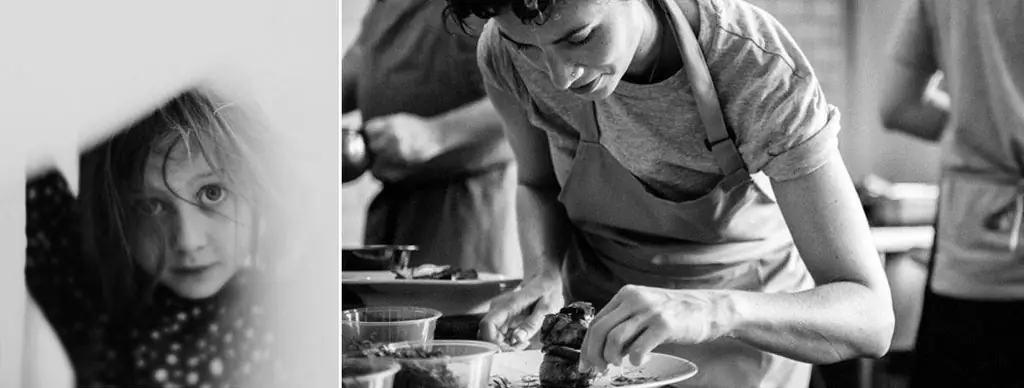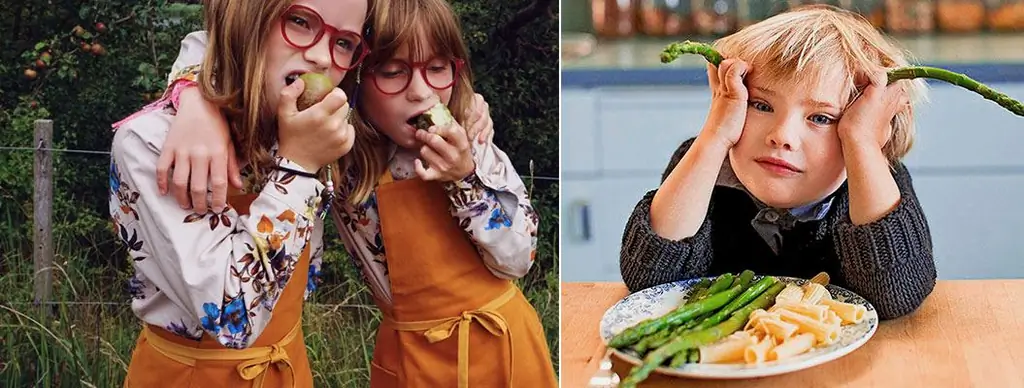- Author Adrian Jeff jeff@psychologosportal.com.
- Public 2024-01-11 09:05.
- Last modified 2025-01-24 14:09.

"You won't leave the table until you eat!" Deep traumas of a happy childhood
What happens to a child when he is forced to eat? The first and foremost thing that happens is the loss of a sense of security and safety. Shouting, insults, threats, coercion - if such things come from the mother, the child loses his footing.
What does food do to us?
What does a hungry person feel when biting off the first piece of bread? Pleasure.
Food is a pleasure for us. Enjoyment of taste, smell, color, shape. The enjoyment of food accompanied all significant events in human life. A successful hunt meant a good meal for the entire tribe. Food served as a guarantee of survival, a hope for the future.
All victories in battles ended in feasts, where each warrior felt like a winner. Good guests were honored at the table, and they felt welcome, their own, part of the general circle. We celebrate weddings, birthdays, any holidays, even funerals by eating together. For what? To share joy or sorrow - to create an emotional connection with each other.
This is a ritual, a tradition, a tribute of respect, a manifestation of feelings, this is much more than a simple satisfaction of hunger. Food plays a huge role in human life. Moreover, it can be both a source of pleasure and a tool that inflicts deep trauma on the psyche.
Force-feeding bomb
Were you forced to eat as a child? Remember the clean plate society? A strict father, a noisy mother or a teacher with a spoon in hand, stuffing the remains of porridge into the mouths of children?
It seems to you that these are all things of bygone days, nonsense, minor episodes from childhood. Everyone has trouble. There are. Only the consequences of some events from childhood we carry with us throughout our lives. And often unconsciously. Passively living the scenario formed at a time when the psyche was just developing - until the end of puberty.
What happens to a child when he is forced to eat? The first and foremost thing that happens is the loss of a sense of security and safety. Shouting, insults, threats, coercion - if such things come from the mother, the child loses his footing. After all, a mother by nature is a source of protection and security, that unconscious sensation that we cannot explain or call in words, but which we feel in childhood. And which allows the child to develop psychologically. Loss of this feeling threatens with inhibition in development.
Force-feeding a child eliminates the very feeling of hunger - an extremely important sensation that has always served as an incentive for any action. It is hunger that visually forms in the child's psyche the correct attitude "if you want something, make an effort." Even at the level to get up and ask.
Lack of hunger, in turn, deprives the child of the opportunity to enjoy food. After all, only what you really wanted is really tasty. No hunger - no pleasure - no joy, which means there is no skill to feel grateful for food.
Yes, you can teach your child to say "thank you" when he gets up from the table. Saying yes, feeling grateful no. And how does this respond in adulthood? An inability to enjoy life, an inability to enjoy the results of one's own efforts and to feel grateful. Force-feeding kills the habit of feeling happy. If there is no joy from the satisfaction of the most elementary desire - the desire for food, then it is very difficult to learn to enjoy the embodiment of all other desires and aspirations.
Another time bomb is innocent, at first glance, parental manipulations in the style of “if you eat all the porridge, you get a candy”, “don't cry - hold a cookie” or “if you obey, I'll buy you ice cream.” In this case, food becomes a reward, a reward, a distraction, and often it is sweets.
This approach forms the addiction of eating when bored, sad, bad, to cheer up, calm down, and entertain oneself. This is a direct path to "seizing" stress and, as a result, excess weight. This is often the root of the problem of overeating in people with anal vector. It is so easy to pamper yourself with food, to reward yourself with this simple pleasure, and it is much more difficult to get the same pleasure from life, from realization, from interaction with others.
It is clear - do not force-feed. But what if the child does not ask for food at all? Absolutely. Never.

Will the little one die of hunger?
Why is it so difficult for us to leave a child without food? What drives us - maternal care or internal anxiety? It seems to us that he will get sick, will not grow up, will receive less love, someone will say that you are a bad mother …
If you are trying to show your love with the help of hotcakes, then rest assured, you will find a million more ways to show it more clearly. One has only to try.
If the opinion of other people about what kind of mother you are is so important to you, think about what makes you a good mother? Your child's ability to be a happy person, enjoy success and feel grateful are not the best skills that he can acquire in childhood thanks to your competent upbringing.
If fear for the life and health of your offspring does not let you go for a minute, makes you control his every step, tremble from any sneeze of the child or scratches on the knee, then you should think about it. The nature of your fears is in another - unrealized emotional potential, and the child is just the closest object for the outburst of your anxiety.
You can give him true motherly love and care, sensual understanding and a much needed emotional connection instead of the nerves of a wrenched mother. Parents with anal-visual ligament vectors often suffer from similar problems. You can learn about what it is, as well as get rid of hypertrophied anxiety for a child, letting him and yourself breathe calmly, at the trainings “System-vector psychology” by Yuri Burlan.
In a modern family, it is almost impossible to create such conditions for a child to really starve, you must agree. No matter how well-fed a person is, the physiology of the body is such that after a few hours without food, he feels a slight hunger. Okay, the most persistent - in half a day.
And this is where other causes of poor appetite begin to surface.
Why can a child eat badly?
Let's start by finding out the main thing: how bad is it? Once a day or three times, but a small plate? Just pasta or just cucumbers? Or, after a packet of cookies on the way home, he doesn't want to eat soup on arrival?
A very simple rule of three can help you here. What does it mean? Three times a day. If a child eats three times a day, that's great. Serving size doesn't matter. Three types of dishes: one hot, one liquid and one raw. If the child ate these three options a day, consider that he is eating normally. Hot porridge, thin soup and an apple, even if not in one meal, but he got them. And this is a great reason for mom to calm down.
Three colors of food. Red borsch, green salad, white rice. Or tomato, fish, orange. Or buckwheat, cottage cheese, grapes. Any three colors in a child's daily diet make it complete.
Encourage your child to follow the Rule of Three. He will have fun, he himself will strive to fit his diet into these three points.
The most common cause of poor appetite is inadequate energy expenditure. Little physical activity. The sun, air and water are still our friends, no matter how trite it may sound. After a day on the river, a football game, or a hike in the woods, not a single child turned down dinner.

Now let's talk about food preferences. Yes, of course, every child has their own eating habits. And they may not be the most useful. Babies with an anal vector love to feast on flour and sweets, prefer to eat their mother's usual food at home and are wary of any innovations in the diet. The most obedient, they are always ready to please their mother or grandmother by eating well. This is worth remembering and not insisting if the child has already eaten.
Children with a skin vector may love fast food, buy chips, sweets or chocolates instead of school lunch, just to seem cooler than their friends. Little skinners can be explained which food is healthy and which is not. This is a powerful argument for them. Chocolates can be easily swapped out, chips become coconut or apple chips, and cola turns into smoothies.
A child with a visual vector is more likely to settle for a colorful fruit salad than gray buckwheat soup. It is important for him that the food looks beautiful. Visual kids love to eat in cafes and restaurants just because the serving of dishes is beautifully designed there. This fact can also play into your hands. Serving, colorful plates, colored foods and the like.
The biggest lovers of experiments and new tastes are children with an oral vector. They are born tasters who are subtly aware of every flavor. They have any, even the most exotic dish, just go with a bang. Moreover, the oral child will tell you in detail about his feelings and the differences between one type of cheese from another, for example.
Understanding the psychological characteristics of children, which means understanding their taste preferences, taking into account the metabolic rate, physical activity and eating habits, each parent is able to compose the child's diet optimally both for the baby himself and for the whole family.
How to develop healthy eating habits?
-
A sense of security and safety is the foundation. That feeling, without which any other upbringing processes have no chance of success. An unconscious feeling that his mother gives the child through her own internal stable state.
The expression “calm mother - calm child” clearly illustrates this mechanism.
- No violence! Complete absence of force-feeding. Not being discussed. Never.
-
Building respect for food. We do not treat food as a given or an insignificant trifle, but as an important aspect of life, without which everything will collapse. We remember the famine times, the experience of grandmothers, we talk about the besieged Leningrad, the Holodomor.
The right attitude to food can be created through family meals, when everyone comes together at a common table. At least once a week. This is a good tradition, unification, creation of emotional bonds, joint enjoyment, communication, a sense of gratitude for food, a common pastime, strengthening the family.
- Eat healthy food together. The child will not eat salad if Dad has fries and sausage with ketchup in his plate. A choice of two or three dishes, taking into account the interests and preferences of all family members, makes it possible for everyone to eat.
- Food should never be a means of manipulation or education - a chocolate bar cannot be a reward for good behavior, as it is a direct way to seize stress in adulthood. Just candy for tea today, and casserole tomorrow. Today is cocoa and tomorrow is herbal tea.
- Appetite is created by physical activity, sports, daily routine, lack of snacks, sweets, and harmful foods.
Eating is one of the ways to enjoy life. The task of parents, on the one hand, is to teach the child to enjoy food, to feel joy and gratitude for it, and on the other hand, to show how many other options there are to feel happy, truly happy, and not just full. Understanding its vectors, its innate features, it is much easier to direct it towards development and create a good foundation for future life, in which attitude to food is just a small bridge to the ability to interact with people in general.







